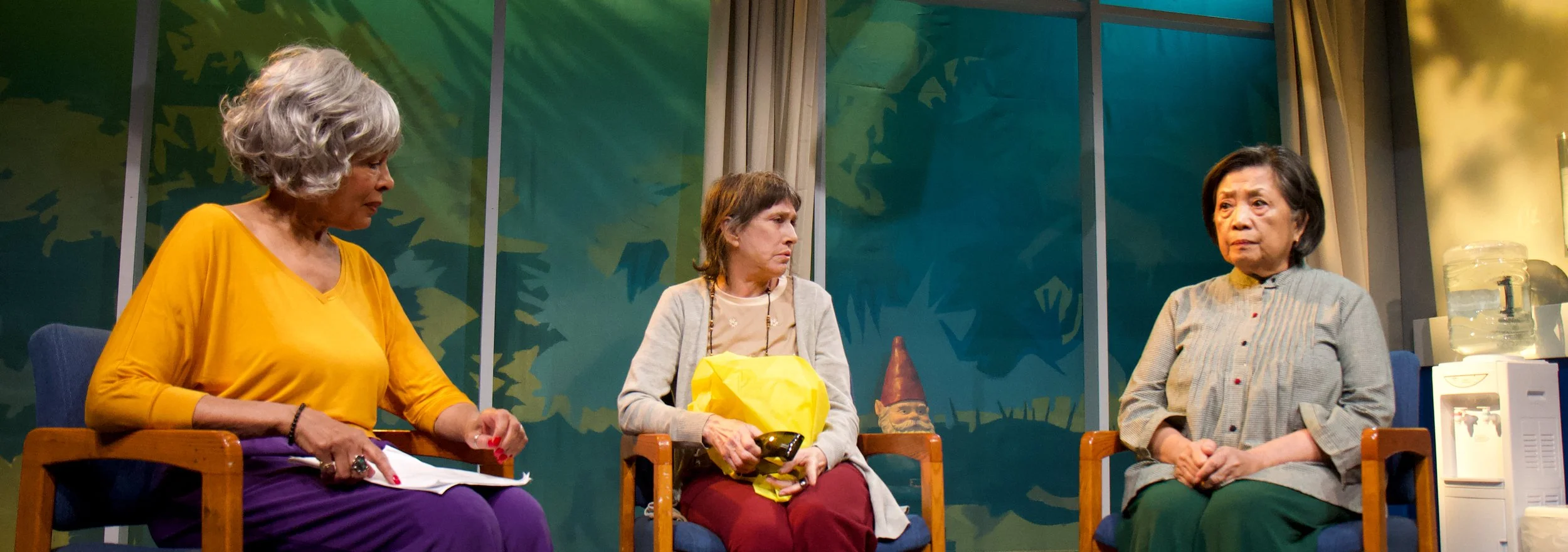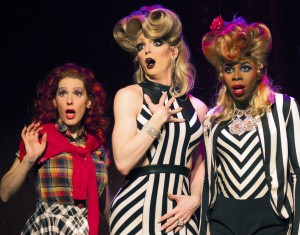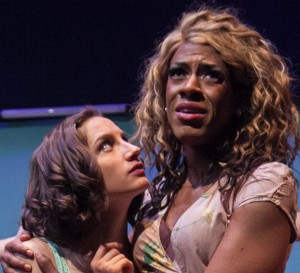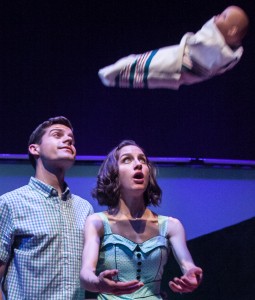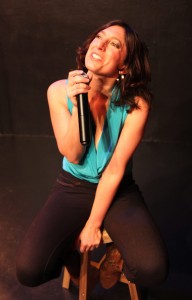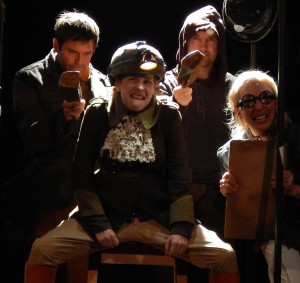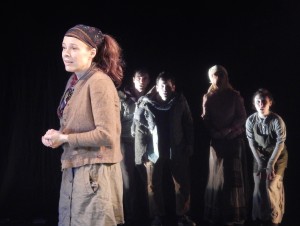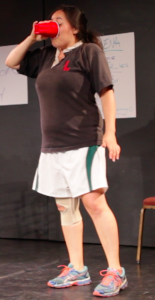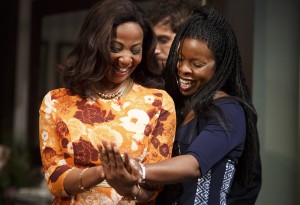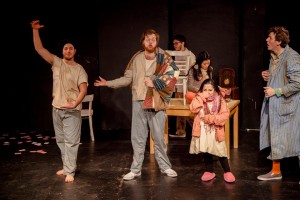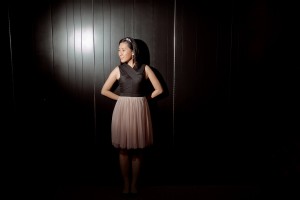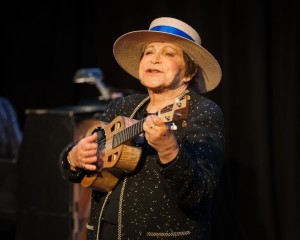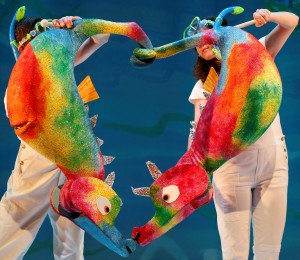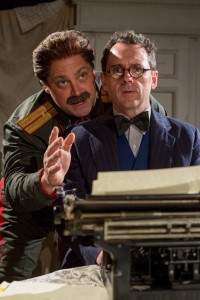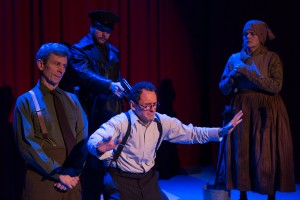Right out of the gate Marshall Goldberg’s original comedy Daddy Issues gets the audience laughing. As lights go up on the lead character, Donald Moscowitz, the audience sees his perfectly toned tush doing what appear to be butt exercises while he’s looking for his cat. “Here pussy-puss-puss. That’s a good kitty. Meow,” croons Donald.
Tongue, Meet Cheek
Follow Nasty Drew (no not a typo) and the Harder boy (well, there is only one after all) as they attempt to solve The Mystery of the Family Jewels, a fun, sexy, raucous evening of tongue-in-cheek comedy, a little drag (hello, family jewels?) and some outrageous burlesque. What burlesque has to do with a spoof of the teen-mystery-novel genre is a good question, but somehow they seriously pull it all together and take it all off.
The mystery is set up by Franklin W. Dixon and Carolyn Keene, respective authors of the super sleuths’ series, The Hardy Boys and Nancy Drew. Tigger! as Dixon and Fancy Feast as Keene are as colorful as their names, in a Dead Men Don’t Wear Plaid kind of way, and create a playful, publishing-world rivalry. When Dixon attempts to engage Keene in a dialogue about the Hardy Boys, she dismisses him with, “Those two boys, always carousing around in that flashy convertible, always seeking to emulate and please the Hardy patriarch. Such strong father issues.” Dixon, not to be outmaneuvered, refers to Nancy Drew’s “questionable relations with those lady ‘cousins’ of hers…” The evening is filled with double entendres (“It’s even more colossal than my ‘Case of the Mysterious Hole in the Wall’”) and early Batman/Boy Wonder dialogue (“Jumpin’ catfish, what is it?”) Laughter, mixed with a ton of silliness and a whole lot of skin, will certainly chase the workday blues away.
Dixon and Keene introduce Nasty Drew (Nasty Canasta) and That Harder Boy (Chris Harder) who take on solving The Mystery of the Family Jewels, which is written and directed by Harder. In the course of the investigation, they meet with the buxom Lady Sussanah LaVeux De Cock; her bawdy cousin Mona Crackers; randy Police Chief McDaniels; the mechanic with lesbian tendencies Nadina North; and Cecilia “Sissy” LaVeux De Cock, Lady LaVeux De Cock’s estranged “twin” sister, among others. (The characters are played by a rotating cast of performers based on the show’s schedule.)
In The Mystery of the Family Jewels the puns, sight gags and extraordinary burlesque keep coming. Pearls Daily as Mona Crackers, who is purportedly from the wrong side of the tracks, delivers a 1920s style flapper number in a wonderful homage to the queen of burlesque, Gypsy Rose Lee. Nasty Canasta follows with a funny and entertaining undercover number employing a fake nose, glasses and mustache, which at first glance seems silly, but just wait.
Feast, who also plays North, Brookeville’s “semiretired, show-stopping sensation of stage and screen,” performs a most bodacious burlesque piece and steals the show with dialogue in the manner of legendary Mae West. Not to be outdone, the men have their own time baring all in the limelight. Ben Franklin as Police Chief McDaniels pulls off “You’ve gotta have a gimmick” burlesque that is straight—in this context used loosely—from Gypsy with hula hoops, the unbelievably limber Tigger! takes it down to a sock puppet, and Chris Harder woos the fans in his unforgettable, charming style, sock garters and all.
The show is sponsored in part by a few local businesses, and commercials are written into the script to promote them. It’s a fun gimmick that needs more attention to detail in the venerable, radio announcer style. Although issues with the show's sound and lighting may be attributed to the slightly random performance schedule, the biggest drawback is that some comic lines can’t be heard and sound levels overpower a few of the songs.
It’s evident that the Mystery of the Family Jewels has a following with a rowdy, adoring audience in attendance, and it’s easy to see why. The cast, taking their lead from Harder and Canasta, has a blast giving their all and baring all. If they break character or a prop doesn’t appear as expected, don’t be surprised, it just adds to the frivolity.
Performances of Mystery of the Family Jewels are 10 p.m. April 29 and May 13 and 9:30 p.m. May 1 and 15 at the Laurie Beechman Theater inside West Bank Cafe (407 West 42nd St.at Ninth Avenue). The theater is accessible from the A,C,E,N,R,V,F,1,2,3 trains at 42nd Street. Tickets are $22, plus a $20 food/drink minimum. A $35 VIP ticket includes reserved seating, a gift bag and a meet-and-greet. To purchase tickets, call 212-352-3101 or visit www.SpinCycleNYC.com.
Boy? Girl? Or Both?
Darren and Janet are the typical white couple, living typical middle-class lives, and waiting for their baby to arrive. Will it be a girl? Will it be a boy? What the couple was not expecting was for the baby to be, well, both.
Explaining gender and sex with an interesting twist, Happily After Ever is a pleasant way to begin a conversation about a hot-button issue. The play begins with Darren (Jeffrey Brian Adams) and Janet (Molly-Ann Nordin) meeting for the first time at a bus stop. “It’s so endearing and not at all coincidental that we happen to be two such attractive, single people sitting next to each other and waiting for a bus that won’t come,” Janet says as the two sit on a bus bench in the rain. And as quickly as their conversation started, the two become married, and suddenly Janet is pregnant—all within about 10 minutes. This lighthearted, rom-com scenario of falling in love at first sight quickly changes when the couple finds out that their baby is intersex. The happy-go-lucky couple is then stuck with the tough decision—what sex should the baby be?
The intersex baby becomes the “odd cookie out” in this cookie-cutter world, leaving Darren and Janet to figure out how to balance their love for their new bundle of joy with their fear of raising a child that is not like everyone else. For the rest of the play, the audience sees into the couple’s home and listens in on their conversations around what sex their baby should be. In addition to their baby’s sex, the couple comments on the way they act and how it is heavily influenced on their gender. With satirical humor drenched in almost every line, the conversations between the couple are upbeat and often produce chuckles.
To add pressure to these new parents, their neighbors, Jerry (Brennan Lowery) and Dharma (Marlon Meikle), come over every week for game night. This odd couple are the typical judgmental neighbors. They add to the satirical humor and outwardly judge themselves and their neighbors’ lives. Although they are jealous that the younger couple have a baby, their dissatisfaction of a baby being more than one sex increases the fear in Darren and Janet’s already distraught minds. Even their talking dog Tommy (Jim Anderson) can smell the sadness on Janet.
In a desperate need to go back to normal, the couple tries different ways to cope with their situation. They even try to ignore their infant:
Darren: I can’t think, Janet. It’s like there’s a noise that won’t go away…. It’s almost like…
Janet: A baby.
Darren: Not quite. Although now that you mention it…
Janet: It’s the baby, Darren.
Darren: Right. The baby.
Obviously this tactic does not work. Their distress escalates to a point where by the end of the play, Darren and Janet have to choose the baby’s sex. Will they choose a boy? Will they choose a girl? Or will they choose to leave the baby as it is and be both?
Sitting in an intimate theater, the audience will get a chance to laugh at the absurdity of the way gender is perceived through the eyes of two typical newlyweds with an atypical child. But in focusing on white middle-class adults, Zlatos steers away from delving into the experience of intersex people. Instead, she focuses the humor on the people who are not intersex.
Costume designer Stephanie Levin helps to amplify these gender perceptions in costumes that reflect both femininity and masculinity. With a cute polka-dot dress for Janet and a fitted shirt and trousers for Darren, the couple is picture-perfect for any Friday night game night with the neighbors. To add to the contrast of female and male on stage, set designer Rebecca Lord-Surratt paints the stage with baby blue walls and hot pink floors, diagonally divided by a suburban green lawn. The set pieces are great for quick transitions and easily transform to the appropriate piece furniture during each scene, while the lights designed by Megan Dallas Estes give the set a crisp, clean sitcom feel. They fit perfectly in this quirky, perky look at gender issues.
Director Sherri Eden keeps up the quickly paced dialogue. The chemistry between Janet and Darren is a little more believable than the chemistry between Dharma and Jerry—however, both fall a bit flat. Their relationships lack a passion and connection with each other that makes their interactions with their significant others less interesting and exciting to watch. However, the overall performances of the actors are engaging and keep the audience giggling throughout.
Happily After Ever is an enjoyable show with easy and lighthearted jokes. Shining light on the daily life of a struggling couple, their neighbors, and a talking dog helps the audience become aware how gender and sex heavily influence the way people think and act.
Happily After Ever runs until April 16 at 59E59 Theaters (59 East 59th St. between Park and Madison avenues) in Manhattan. Evening performances are at 7:30 p.m. Tuesday through Thursday and at 8:30 p.m. Friday and Saturday; matinees are at 3:30 pm. on Sundays. Tickets are $18. To purchase tickets, call Ticket Central at (212) 279-4200 or go to www.59e59.org.
I Want to be Your Friend
Very much like a schoolgirl dancing around her room, Alicia Dattner begins her one-woman show, The Oy of Sex, with a rousing version of “I Want to be Your Lover” by Prince. As she settles she begins to engage the audience by talking about sexual experiences. Dattner kids around and says, “O.K., you first.” The evening proceeds into an autobiographical journey exploring the world of sex, more specifically love and sexual addiction. “You–we–will never be the same, from this night forward.” Tall order. Her background as a stand-up comic is clearly evident by her delivery, timing, and most importantly, storytelling.
Dattner takes the audience to her early puberty days with “Dear Diary, I can’t wait until the kissing starts!” and then she practices kissing with her hand aka Señor Wences. For her high school and college years Dattner says, “it’s kind of like my clitoris was slutty, but my cervix was a prude.” Eventually she surrenders her virginity after listening to “April in Paris” when the guy she was seeing didn’t leave. “This must be what love is, right?” to her eventual disappointment, “I waited 21 years for that? It’s just his penis going in and out?” and Dattner mimics the motion with her hands. There are some great lines in The Oy of Sex as one might expect from a seasoned stand-up comic. Describing her boyfriends and sexual adventures, Dattner is often quite funny. “Max was sort of like a frat boy, without the college. Not a catch. More of a catch and release. He was so dumb that he thought anthology was the study of ass holes.” Dattner also says, “My dad's family is Jewish, and my mom's family is atheist. So I want to marry a doctor who's good enough for me, but I don't believe he exists.” Pause, rimshot. The performance rests comfortably between stand-up comedy and a working copy of a ‘chick flick.’ What’s missing is a range of emotion.
Dattner is smart, funny, entertaining, talented and full of energy. Her delivery of getting hit on by another woman, Anastasia, was complete with wild abandon even as she was faking it with "When Harry Met Sally" style. It was almost as if watching Anastasia go down on her–it was that good. When Dattner is asked to reciprocate Dattner's expression is priceless. But this performance is not just comedy nor is it stand-up. As Dattner continues through the many lovers and trips to Burning Man it gets clear that sex and love for her is a problem, and instead of a new lover she seeks help. Dealing with addictions, while serious, can be funny and still be enlightening. The confluence of a great writer with a talented actor can bring out the depth that comes with the desperate actions of an addict wrapped up with self-effacing humor. Dattner’s range remains in the realm of stand-up, and make no mistake she is quite funny.
Whether Dattner’s choice, or her director Tom Bentley-Fisher, she uses a hand-held microphone the entire performance. It is not necessary for a theater like The Bridge. As a stand-up comedian working a large house it is indispensable or it can be useful for sight gags. It is phallic, after all. However in this experience it boxed her in as a stand-up comedian. While she is quite adept at choreographing her use of a microphone it got between her and the audience limiting her range of emotion, especially as she attempts to express more vulnerability delving deeper into her 12-step program and interactions with her sponsor. On stage Dattner owns the word certitude, and she is incredibly self-assured; delivering a solo show you have to be. However, the development of an intimate relationship with the audience beyond being funny is lacking. It's as if she wants to bring more to the stage but is locked in an old paradigm.
Dattner brings the The Oy of Sex full circle, declaring, “Knowingly or unknowingly, your consciousness has been raised.” She goes on to say, “But from this moment forward, you're a different person.” Again, a tall order. There is a lot of laughs, and she brings an incredible amount of energy to the stage. Dattner opens her life up to intense scrutiny for everyone to see, but as good as a stand-up comedian as she is, and she has honed her craft, it still feels like stand-up. The raffle after the curtain call confirmed it.
The Oy of Sex runs until April 17 at The Bridge at Shetler Studios (244 W. 54 St. between Broadway and Eighth Ave.) in Manhattan. Evening performances are Wednesday through Saturday at 8 p.m. and Sunday at 2 p.m. and 7 p.m. on April 10 and 17. Tickets cost $20. To purchase tickets, call 212-868-4444 or visit smarttix.com.
“The Ring Has Awoken…”
Sam Gamgee, in the movie Lord of the Rings: The Fellowship of the Ring, righteously declares that "there’s some good in this world, Mr. Frodo… and it’s worth fighting for.” Good theater is also worth fighting for, and you may very well find yourself battling to get a ticket to see Fly, You Fools! Presented by Recent Cutbacks, it is currently playing Friday evenings at Peoples Improv Theater in Manhattan.
Q&A: Stronach’s Choreography Drives ‘Light, A Dark Comedy’
Tami Stronach began her career playing the Childlike Empress in The NeverEnding Story (1984). However, she followed the screen credit by pursuing dance. While dancing full-time on her toes, she started to miss theater so her next move brought her back. Fortunately, acting chops didn’t have to suffer the lift her high step always gave her. As part of Flying Machine with several friends, this company approached theater though movement, and for seven years, she stayed connected to both disciplines before folding. But the members eventually realized they missed each other, and coalesced movement around providing high quality theater for families. The formation of Paper Canoe would coincide with a New Victory Theater LabWorks program seeking plays for children and resulted in a production that “sucks the light out of the theater,” according to Stronach, who choreographed the play and stars as the lead character Moth. OffOffOnline: So does Light, A Dark Comedy have everyone in the dark, bumping into each other?
Stronach: No, the play is well lit. The audience can see everything. It’s the language of the play. But the premise is the sun has been stolen and forgotten. We’re trying to show how quickly history can vanish, and the importance of keeping stories alive.
OffOffOnline: Who stole the sun and why?
Q&A: Stronach’s Choreography Drives ‘Light, A Dark Comedy’
Stronach: The world was constantly lit and everybody worked all the time. This meant everything was go-go-go, and people never saw their children. At the same time, the space for reflection and dreaming got sucked up into this constant, bright, manic whirlwind. So an inventor tried to bring balance by creating a dark maker and ended up stealing the sun. The world was left in the dark, and Moth, my character, is trying to bring it back.
OffOffOnline: Where did this idea come from?
Stronach:We were brainstorming, and our director (Adrienne Kapstein) just said, “what if we created a world where there was no light.” We decided that was near impossible. But the impossibility intrigued us. Then Greg Steinbruner, Robert Ross Parker and I went on a writer’s retreat. We covered the wall with Post-it Notes and came up with the first two acts. But eventually Greg made revisions and completed the end. On the other hand, this is physical theater. So the story was written as we improvised things in rehearsal. We would then go home, and write what they saw. So the relationship between image and text was very organic and fluid. This amounted to a play written by a choreographer, a writer and a physical theater artist—providing all these different entry ways into the drama. Then last year Greg Steinbruner rebuilt the script into what it is now with the help of dramaturge Jeremy Stoller. Ultimately our goal as a company is to produce work that is as rich in narrative and text as it is invested in creating visual poetry.
OffOffOnline: Can you describe this world a little more?
Stronach: The actors wore a headgear called dim makers, which helps them see, and the city functions on a grid of hooks and ropes so people don’t get lost. It’s sort of like the trolley system in San Francisco. But acts as a metaphor for staying inside the box and not questioning the way things are. As a result, adults might contract “the sleep,” where they enter into a dream state and never come out.
OffOffOnline: How does Moth figure into all this?
Stronach: She unplugs from the grid, and goes off into the darkness where she meets a boy who has lived his whole life alone. Figuring out all these genius mechanisms for surviving, they then meet Sunny and Ray who have created a clandestine radio show. From their platform, the duo pretends to be on a beach and have gone into complete fantasy to deal with the problem. So they sit around and pontificated about the sun without doing anything about it. But the idea is to have characters with flaws and together there’s enough inertia and alchemy to achieve the things that shift society.
OffOffOnline: The play is billed as a little scary? Do parents have to worry?
Stronach: Well, it’s a mix. There’s a lot of humor, but I think losing your mom in a black void would be scary for a 4-year old. An 8-year old, on the other hand, should be fine and doesn’t mind being a little scared—especially since we have a happy ending.
OffOffOnline: What was the challenge of writing for children and adults?
Stronach: People underestimate the intellect of kids. They come into the theater with fewer assumptions and are more willing to be carried away by the story. So the story can reach audiences of all ages.
OffOffOnline: Finally, what message are you conveying about breaking free from your parents’ worldview?
Stronach: Moth doesn’t accept the gloomy truth she’s supposed to accept, and she changes the world. So I want my daughter to believe that she has the strength to find solutions that my generation didn’t think of.
Read Ray Morgovan's review of Light, A Dark Comedy here.
Light, A Dark Comedy runs until April 10 at the Triskelion Arts Muriel Schulman Theater (106 Calyer St. between Clifford Pl. and Banker St.) in Brooklyn. Matinee performances are Saturday and Sunday at 10:30 a.m. Tickets cost $18. To purchase tickets, visit www.papercanoecompany.com.
The Opposite of Light
Light, A Dark Comedy is a clever and smartly written play wrapped neatly with an amazing array of costumes, puppetry, lighting and media. It delivers a futuristic world ruled by an evil mayor and her equally evil, if somewhat “pretentious mystical nitwit,” sister. Sunlight has been literally sucked from the sky and leaving everyone to "stay online" or fall into darkness. No one really remembers actually seeing the sun, however, there are references and ditties scattered throughout the play that alludes to the sun. So much so that the words "day" and "light" have been replaced with the word "dim." What happens to the human spirit when subjugated by darkness and despair? And, for a young girl–what will she resort to for extra rations for her and her mother?
While pulling from modern mythology, movies and history, Light, A Dark Comedy is rich with symbolism making for an ominous, expressive tale for a modern age by playwright Greg Steinbruner. The story follows a young girl called Moth on a journey through her own darkness, from completely believing the evil Mayor to eventually confronting the truth and the Sandman. Along the way, Moth, played by Tami Stronach, encounters the Sleeper Services, who take away those who have fallen asleep. Moth also comes across the evil Mushanto Mushroom Corporation–where orphans are conscripted to work off their debt to pay for the care of the sleepers, The Underground–a rag tag group making up the resistance movement, the Queen–whose whispers cause people to sleep so that she can control their dreams, and finally Sunny and Ray–who broadcast an illegal radio show with supposedly cryptic messages for The Underground. The story languishes in the middle and it might be a tough sell for children due to the length and heavy subject matter. However, the detail in the story woven by Steinbruner and the tightly choreographed production is incredibly engaging.
Light, A Dark Comedy is brought to life by a great cast who, with the exception of Stronach, play multiple roles while creating and re-creating the stage for each scene. Here, darkness and shadows allow for characters to blend in while holding up a screen to complete the set or make a large flock of birds swirl overhead. Stronach, similar to Judy Garland in the Wizard of Oz, is the thread throughout this 90-minute journey and is rarely off stage. She, as well as the entire cast, is completely immersed in her character, movement and the story. Everything is so tightly intertwined to bring anything less to the stage could easily be catastrophic. Carine Montbertand plays the evil Mayor with great aplomb delivering a wicked, sinister character. It is her portrayal of the Mayor’s sister, The Queen, though, that appears forced. It is almost as if she is trying too hard to make her character uniquely different than the Mayor. Steinbruner's play challenges six actors, including himself, to play 16 roles in one production. With the extraordinary direction of Adrienne Kapstein the cast utilizes every opportunity to nuance 16 characters to life. From language and dialect to physical attributes and an abundance of costuming this is a challenging play both physically and mentally, and the cast made it appear seamless under her guidance. It is quite surprising when only seven actors appear on stage at curtain call.
Before all of this could take place, a talented development team created a very complex and moving production. Barbara Samuels delivers unique lighting to a relatively sunless play, Theresa Squire layers costumes for 16 characters to change into quickly, Mark Van Hare designs subtle sounds and striking music, Tom Lee designs vivid projection imagery, and Lake Simmons' delightful puppetry includes an expressive chicken laying an egg and a giant dragonfly who buzzes about the characters. Tying the vivid production together is Deb O with a steampunk style set design that utilizes three rolling “stages” and holds a multitude of props to create scene upon scene.
Light, A Dark Comedy is an unexpected 90 minutes that touches each of the five senses and is an invitation to explore the sixth. As Moth describes, “It’s on the tip of your tongue, but the name of the thing–the thing that’s missing–just doesn’t come to your lips.” It’s when Moth ventures out into the world and she comes to the crossroad of curiosity and dreaming, that she understands that only light can overcome darkness.
Light, A Dark Comedy runs until April 10 at the Triskelion Arts Muriel Schulman Theater (106 Calyer St. between Clifford Pl. and Banker St.) in Brooklyn. Evening performances are March 25 at 7:30 p.m. and matinee performances are Saturday and Sunday at 10:30 a.m. Tickets cost $18.00. To purchase tickets, visit papercanoecompany.com.
Womanhood Through Rugby
As the final performance of the month-long FRIGID New York at the Kraine Theater, the autobiographical one-woman show "With You!" was an uplifting crescendo to a powerful festival. With You!, written and performed by Una Aya Osato and directed by Nelson T. Eusebio III, starts out as a peppy, quirky coming-of-age story of a young awkward athlete gaining her confidence in her sexuality and herself through college rugby. While Osato energetically transports us through her four years of college rugby, it is easy to see how important these growing pains are to discovering who we really are, what really matters to us, and what's important in the world outside ourselves. As Osato shares her story and how team sports helped her in her self quest, we are reminded that we are a product of our experiences.
Osato is a fireball of electricity as she jumps out in her gym clothes and hypes up all theatergoers. The audience literally feels like they are in the bleachers during the game as she runs, jumps, rolls, and bounces back and forth from characterizations of herself and her teammates. Eusebio, as Osato’s director, knows his performer well and sets her free. She fluidly leaps back and forth acting out the various plays of the game and creating the drama and excitement of winning. The audience can’t help but high five with Osato and cheer her realization of her own power.
As Osato playfully explains the meaning of the rugby songs at the after-party, she also reveals its significance in her social and sexual development as a woman. Osato has the comedic physical talent of a Lucille Ball as she pops from her awkward self to the various girls she is attracted to on the team. Eusebio’s direction allowed her to dance from each very specific character to her own younger self who is left trying to figure out the rules of the game and life.
Particularly humorous was her interpretation of her budding relationship with one of the more seasoned players who offers her advice on love. Osato’s talent is her ability to reveal the deeper emotional issues by how she builds the physical life of her characters. As she shares her story, she also reminds the audience on the importance of creating early bonds in friendship. And just like the rest of us, it is not until heartbreak and isolation that she really comes of age.
The piece ends with a more mature, confident woman returning to her alma mater to encourage the young athletes of tomorrow. As she reflects back with the wisdom of hindsight, she shares the lessons she really learned during that vulnerable time of development when she discovered her identity through team sports. She learns we must experience the struggles of love and identity to be able to bring about positive change in the world.
While the festival is over, FRIGID NY sponsors eight festivals a year. Visit http://www.horsetrade.info/frigid-festival to learn more about the festival's various events. Una Aya Osato can be seen in various venues across the city and the country and other “Una Happenings” can be found on her website, http://www.unaosato.com. For more information about upcoming events at The Kraine Theater (85 East 4th St. between 2nd and 3rd Aves.) in Manhattan, visit http://newyorkcitytheatre.com/theaters/krainetheater/theater.php.
A Tawdry Tenement Tale
For several years David Staller’s Project Shaw has been presenting monthly readings of the plays of George Bernard Shaw, whetting the appetites of fans of the Irish socialist. Widowers’ Houses, written in 1892 and now presented by TACT and Staller’s Gingold Theatrical Group in a full production, is the first of Shaw’s 65 plays, and it is astonishingly topical.
The plot is simple enough. On a Rhineland holiday, young Harry Trench (Jeremy Beck) and his companion Cokane (Jonathan Hadley) encounter bluff, social-climbing businessman Sartorius (Terry Layman), traveling to introduce his daughter, Blanche (Talene Monahon), to continental culture. The playwright’s satiric instincts are almost immediately on display, as Cokane, attempting to show his worldliness, mispronounces words like “distingué” and orders stones in fractured German.
But the humorous jabs at the class-conscious British belie the darker thrust of Shaw’s play. Here the playwright takes on tenement housing, society’s indifference to the poor, and the ruthlessness of businessmen—topics that still sizzle. Trench and Blanche strike romantic sparks, but Sartorius, while favoring their marriage, requires that his daughter, raised middle-class, will be accepted into the aristocracy: Trench is a doctor with limited income, but his family includes nobility. Sartorius has oodles of money, and essentially means to buy his daughter’s entry into the upper class.
Shaw introduces strong class friction to the business, exposing Sartorius as ruthlessly oppressing the poor. Reviewing the books on his real estate holdings, he discharges his toadying overseer, Lickcheese (a crestfallen John Plumpis), because he has bought wood to fix a dangerous staircase in a tenement.
The plot takes a darker turn when Trench, having rejected financial support from his prospective father-in-law, finds himself entangled in the very oppression of the poor for which he disdains Sartorius. In 1892, critics attacked Shaw’s portrayal of the businessman, and Shaw responded in a letter to The Star: “They denounce Sartorius … as a monstrous libel on the middle and upper classes because he grinds his money remorselessly out of the poor. But they do not (and cannot) answer his argument as to the impossibility of his acting otherwise under our social system.” Shaw’s assessment is still so clear-headed that it will make audiences think hard, if not squirm.
Under Staller’s direction, the actors do splendidly. The youthful Beck is by turns romantically besotted, appalled at the social implications of his alliance with Blanche, and helplessly trapped by Darwinian capitalism—and he delivers some pratfalls as well.
Shaw is not above borrowing the high style of his countryman Oscar Wilde, either; a scene of serving tea is played by Beck and Monahon with a casual archness, as if they were in The Importance of Being Earnest.
“Sugar, Dr. Trench?” asks Blanche, serving.
“Yes, please.”
“One or two?” she asks.
“I rely upon your better judgment,” says Trench.
“Quite right.”
For her part, Monahon starts as the cool object of Trench’s affection and slowly reveals herself as a “nasty little shrew,” as Max Beerbohm called her in a 1909 review. There’s a moment early on when, following Sartorius’s discussion about Trench’s marriage to his daughter, Blanche enters and seems to give a con man’s nod to her father; they have both fixed on Trench, it’s clear, and, if Blanche is unaware of the tenement incomes, she is in league with her father to marry well.
There are hints, too, that Cokane is a closeted homosexual. Apart from the flamboyance with which Hadley invests the character, there’s a telling moment when Trench, seeking Cokane’s help in writing a letter, curls his lip and pouts flirtatiously with his friend—a savvy heterosexual using his appeal to wheedle his gay chum for a favor.
Here and there Staller gives a textual boost to Shaw—an early joke depends on knowing a period brand of water that Staller clarifies. Later he substitutes a generic reference for “the North Thames Iced Mutton” company; the latter surely plays more comically in Britain than here. It’s symptomatic of the care Staller has invested, although the climactic moment seems the director’s own. Trench, having acquiesced to a business deal proposed by a newly thriving and conniving Lickcheese, is suddenly lighted garishly by Peter West as he hears snatches of dialogue from earlier in the play. He’s like a fly caught in a spider’s web. It’s a more overtly cynical note than in Shaw’s original, but the playwright might still have approved.
TACT and Gingold's Theatrical production of Widowers’ Houses plays through April 2 at the Beckett Theater in Theater Row, 410 W. 42nd St. off Ninth Avenue. Evening performances are at 7 p.m. Tuesday, 7:30 p.m. Wednesday and Thursday, and 8 p.m. Friday and Saturday. Matinees are at 2 p.m. Saturday and Sunday. Tickets are $63.25 and may be purchased by calling Telecharge at (212) 239-6262 or visiting www.telecharge.com.
Secrets, Secrets Are No Fun
Stop for a second and think about the way in which one interacts with one’s family, the way one assimilates to one’s society, how one honors one’s ancestors, how one speaks one's truth, and most importantly, how one heals oneself. Familiar, written by Obie Award winner Danai Gurira, challenges its audiences to think of all these situations. However, it is also a play that one must watch in order to fully understand how it can be powerfully healing and a life-changing experience for the audience.
Directed by Rebecca Taichman, Familiar tells a story of a Zimbabwean family living in Minnesota. The eldest daughter, Tendi (Roslyn Ruff), is getting married in a matter of days, and her rehearsal dinner is in a matter of hours. As the family prepares for the rehearsal dinner, Tendi and her fiance Chris (Joby Earle) announce to the family that in addition to a traditional Christian wedding, they are including a Zimbabwean ritual. This unexpected turn causes secrets to be revealed, old wounds to reopen, and forces the family to speak the truths about the past.
Although not based on her life, Gurira draws upon her own experience to create a credible script. Similarities between her life and the script includes how her Zimbabwean family also moved to the U.S. and how she was raised in Iowa while the family in the play live in Minnesota. In addition, the script allows the actors to unapologetically speak Shona as she presumably also did in her household. Unlike other shows that often translates anything other than English, Familiar takes advantage of an opportunity to be authentic, as well as give any audience member who speak Shona a small taste of home.
The ensemble includes, the father Donald, played by Harold Surratt, who grounds each scene with subtle facial expressions and dialogue. Myra Lucretia Taylor as Anne, Tendi’s aunt, is a strong and demanding presence on stage that is the main person connecting the family back to Zimbabwe heritage and ancestors. Anne’s sister Margaret, played by Melanie Nicholls-King, is the glue that keeps the family under control, even when she might feel her own life is falling apart. A definite gem in the performance by being the character that continually handles her sisters Anne and Marvelous (Tamara Tunie), as well as continually attempting to keep everyone calm. Ito Aghayere as Tendi’s sister, Nyasha, whose relentless need to bring the family back to their traditions heals the family. Her energy and enthusiasm propels the play forward and brings it back to a nourishing place.
The ensemble's chemistry and impeccable timing is a tremendous success to the production. Ruff and Tunie exhibit the vulnerable bond between mother and daughter. To balance them out are the future family members, “white boy from Minnetonka,” Chris (Earle) and his brother Brad (Joe Tippett). Their natural comedic interactions add to the play and cause the audience to laugh and scream in enjoyment. Overall, it is the ensemble’s conversations and arguments that encourage open discussion about past family issues, current events and pushes the audience to question their own lives.
From any seat, the audience can see all aspects of the highly-detailed set designed by Clint Ramos. Marvelous’ and Donald’s house is two floors with hallways, real doors and family pictures lining the wall. It is a breathtaking set that anyone would want to live in, including the audience who sit in comfortably cushioned seats, as if sitting on individualized mini couches. To support this design, Obie Award winner and lighting designer Tyler Micoleau incorporates the lights into the structure of the set to allow it to seem natural. Even the window is lit so that it appears as if looking out on a snowy day in Minnesota.
Another noteworthy design element was the sound design by Tony Award winner Darron L. West. During intermission, the recordings of celebratory Mbira music by the Shona people of Zimbabwe filled the theater. With a very hectic and hilarious ending to Act One, the traditional music played during intermission is a great way to gently introduce the audience to Zimbabwean music, as well as connects with the Mbira that is presented by Nyasha during the performance.
Young, Scrappy and Hungry
In the musky glory of The Kraine Theater, the March family spits crazy rhymes and self-professedly drops beats like a smooth silk ribbon. Although jaunty violins welcome us inside, it is the quick enticement of Lil' Theatre Company's hip-hop musical that soon settles us into our seats. Lindsay Taylor and Sara Stock are the writers of Lil' Women: A Rap Musical, which was inspired not just by Louisa May Alcott's novel but also by a certain popular rap musical that sends all who see it into fits of religious praise: Hamilton. The influence is too obvious to go unnoticed—sometimes to the production's occasional weakness. In an effort to reconcile the massive success of its progenitor with its own relative obscurity, Lil' Women drops hints of its inspiration while trying to break new ground with reasonable success.
Originally from the show streets of Orlando, Taylor's production is one of the more standout shows at this year's FRIGID NY festival—she is credited as the director and producer of Lil' Women. Its concept invites apprehension and interest in equal measure: taking a beloved classic and subverting its white, all-American tradition is no easy task. Many already know the story: Meg, Jo, Beth and Amy March weather crises of faith, friendship and love as they grow up under the benevolent eye of their parents, mischievous Laurie (the boy next door) and John Brooke (his tutor). It reads like a soapy, sweet tale, promising an uncomplicated ending. But somehow Taylor's hilarious spin on the March family makes it easy to forget the all too well-known plot, and enjoy the droll, nudge-nudge moments of musical inspiration that slips and slides from the pens of Taylor and Stock.
Beth pulsates with witty energy; she isn't the dowdy, quiet angel that Alcott canonized in her book. Megan Borkes renders her active, self-aware and irrepressibly engaging. Croix Provence's Amy begins as a childish caricature of Alcott's character, but by the end of the play, she is brimming with womanly wit and charm. Even mature Meg, played by the highly entertaining Toni Bonaccorso, sneaks in some character development even as the show speeds through the plot. Her meet-cute romance with John (a disarmingly funny Gregory Coleman) is a delight to watch, and her command as a rapper, while seemingly incongruous for a dimpling redhead, is especially astonishing. But by and large, the play is carried on the very able shoulders of Rebecca Siegel, who plays the glorious spitfire that is Jo March. Siegel is perhaps the best rapper of all her sisters (although Meg might disagree; the two have a fantastic rap battle— mediated by her mother, played by writer Sara Stock—that helps the audience settle who the better rapper is), and her singing voice is quite agreeable too. Her most poignant, Jo-like moments come during her interactions with Beth, Laurie (a rib-ticklingly wonderful Adam DelMedico) and Friedrich Bhaer (played by a superb Justin Aldridge), the three most important agents in her life.
The reigning star of the show is the music: rhymes and dialogues flow seamlessly from the actors. The cast does not for a second call into question its rapping abilities. A particularly enjoyable song (and one that refused to stop playing in one's head) is "Commander in Chief" sung by Mr. March, played by the supremely talented Jason Blackwater. The partnership between Taylor and music writer Isaac Folch renders even the most mawkish episodes from Alcott's book (namely Mr. March's return from the war) side-splittingly funny. If there is one avenue where they falter, it is in the story. For a tale as often told as Little Women, it might take more than a rap musical to refresh its well-known denouements. But even as the show whizzes past key scenes (Beth's passing, John and Meg's married life, Jo's publications and Amy's brush with death), the production leaves us quite content in its attempt to refurbish a beloved story.
The costuming is subdued yet appropriate; it doesn't seem anarchic or anachronistic, as most period costumes do in intimate settings (costume is by Borkes, Siegel and Taylor). The set is an empty black box, and in some ways makes the action in front of it all the more colorful. The main star of the show, however, is the music. Hip-hop is a nascent musical medium, especially on the Broadway stage. Hamilton has made rap music palatable to the largely white, upper middle-class audiences of New York, with the same brand of spine-tingling newness that Lil' Women has successfully emulated. One could say that Miranda's juggernaut endeavor has just spawned the first (of its undoubtedly many) children, and no-one's complaining. Lil' Women, for all its overt obeisances to Lin-Manuel Miranda's genius, borrows the same penchant for envelope-pushing musical entertainment.
The last performance of Lil' Women: A Rap Musical at The Kraine Theater (85 East 4th St. between 2nd and 3rd Aves.) was March 5. As part of Orlando International Fringe Theatre Festival, Lil' Women will run from May 19-29 at the Orlando Shakespeare Theater (812 E. Rollins St.) in Orlando, FL. Tickets are $11 with the purchase of the Fringe button starting April 14 at www.orlandofringe.org.
Writer Madness
The Golden Smile by Yaakov Bressler and directed by Joey Stamp is an absurd, hilarious and energetic play that is sure to break the winter funk. The play opens with a group of characters, patients to be more exact, in a mental institution. The patients try to create a play that will save their privileges in the recreational room. Some patients have an ulterior motive to win the heart of their beloved Claude–who is never seen but heard about in songs. Theatergoers enter the patients’ world, which is filled with twists and turns, and witness what the patients will do to write their play.
The cast is fun and filled with energy. The audience gets to see a glimpse of the characters’ mental conditions and personalities. However, their personalities can be more diverse and more nuanced as the play provides the space for this type of character exploration. One actor that stands out is Sofiya Cheyenne (Group Leader). Cheyenne is captivating and delivers a strong and engaging performance. Cheyenne really puts a punch to the witty and sarcastic lines. The entire cast, Andy McCain (Writer), Jody Doo (Sarcastic Actor), Flynn Harne (The Messenger), Robert DiDomenico (Loathing Actor) and Isaac Boorstin (Angry Actor) are talented and versed in both acting and musical theater.
The songs are playful, graphic and wacky. Composer and Musical Director Zach Stamp matches the music with these wonky characters. The music moves along with the tone and nature of the play. Costume and Prop Managers Rivkah Spolin, Shelly Ben-Yshay and Carrie Pieper designed the set and costumes accordingly. The set and costumes coordinate with the vibrant personalities on stage. They do an excellent job alongside Stamp’s direction. The creative team piece this insane world together for audiences to be hooked for a whole hour!
There are two plots in this play: one of the actual play and the other of the characters’ creative play. The big plot flows and the audience clearly understands the wants of each character. They all collectively want to write this play but they have different ideas and direction on how to go about it. How they figure it out is the fun part for the audience. Eventually, the group comes to an agreement and they have a play. Their play’s plot gets a little sloppy when they begin their quest for the Golden Smile. Then again, they are mental patients so their level of coherence may be off. Bressler has to be very clear with his intention at this point. The patients show strength, courage and determination, and represent much of who they are as a group.
In the end, they create a tender story about preservation and happiness, which by the same token is ironic considering their circumstances. They find their “golden smile” as many writers or artists in general find theirs. Bressler seems to be drawing connections to how insane the writing process is for writers and what better way to show this than to have mental patients trying to write a play. It is a wonderful premise and one that many writers would agree with. This is Bressler’s first play–he has a knack for humor and sharp dialogue. Audiences will be excited to see how his work evolves.
The Golden Smile serves to be an exhilarating night at the theater. Watch it for the humor, energy, witty lines and music. It is sure to get everyone walking out with a smile and maybe even a golden one.
The Golden Smile is part of the Frigid Festival, which is showing over 150 performances in two theaters and over the span of three weeks. The festival is founded on the idea of providing theater artists the opportunity to produce their own work.
The Golden Smile runs until March 5 at The Kraine Theater (85 East 4 St. between 2 and 3 Aves.) in Manhattan. Tickets are $15. To purchase tickets, call (212) 777-6088 or horsetrade.info.
A Baby Pink Kinda Life
Most little girls wish to be seen as cute, popular, and smart. They want to receive positive attention. They want to have lots of friends and fun things to show off to them like cute clothes, toys, and makeup. In Julia Sun’s case all she ever wanted was “to look nicer than I was.”
Sun’s solo show, Acute…Girl, which she wrote and in which she performs a variety of characters, draws on her life. The play opens when Sun is just about to turn 10. She relates that her dad used to tell her “that as soon as you acknowledge your flaw, nobody can use it against you.” Sun’s flaw is wanting to be popular and to look prettier. She goes out of her way to get in the popular circles at school. She allows her “best friend” Stephanie Trimmer and the other “Glamour Squad” girls to copy from her homework so she can sit with them during lunchtime at the popular table. Being from a low-income family and around a grandfather who “believes paying attention to one’s appearance is almost like a cardinal sin” means that getting a “baby pink Hello Kitty watch” for her 10th birthday wasn’t going to happen.
As Sun’s story progresses, she moves into a new school district in sixth grade and the urge to be popular, noticed, and prettier just keeps getting stronger. She takes hand-me-downs from Stephanie before her move, proclaiming that in the next chapter of her life she is going to be seen as stylish. It works. She is asked out by David Cohen, the most popular guy in middle school, who tells her, “I need to get a library card because I am checking you out.” She is once again associated with the cool kids, although it still doesn't feel like she had earned the title of truly being popular.
In high school she decides that she is going to prove to herself that she can be popular all on her own, without anyone else’s status to cling to. She gets a job behind her parents’ back at the “Vidal Sassoon Hair Salon” as a receptionist. It allows her to get free haircuts and styling as well as meet the man who tells her that she can make it as a model. She earns money so she can be coached in modeling and for costume wear for the Miss Teen America competition.
After all of her hard work over the years, Sun reports, she is now a TV commentator in New York City. “I get to be prettier whenever I want now,” she says. “I’m the blonde now, so who cares if I’m not put-together in the subway?” Sun’s retelling of her life’s major events is done with humor and a sweetness that is carried throughout. The costume choice of Sun’s ninth-grade self—black ballet flats, pink tutu-like skirt, and tiara—give her an air of innocence. Under the direction of Christine R. Miller, Sun takes on many different physical levels with her body and finds mannerisms to make each of the characters distinct. Most impressive is when she mimics a ballet performance, finalizing the dance sequence with fully extended splits. However, Sun’s French accent could use some work.
Sun’s show is a no-frills, no-fuss show, yet another commonplace story of a young girl growing up in American society and reaching for celebrity. Sun conveys to the audience that she takes charge of her “flaw” and the way she becomes popular in high school. She goes from relying on other people to make her feel popular to making life decisions that helped her get to where she is now: a confident local celebrity who no longer worries about how she looks every day because she is known as a beautiful woman. She has a team of people to make her beautiful whenever she wishes.
There is, however, a major gap in Sun’s story. How is it that she went from being in high school and participating in the Miss Teen America Competition to being spotted as a local celebrity in the New York subway? How did Sun end up in New York, when she is originally from San Francisco? It seems as if the time limit imposed by the FRIGID festival has forced Sun to end her play in a disjointed, abrupt manner. Perhaps she will expand the show with the missing details if she decides to perform it again.
Although Sun's story is fun and fluffy, the show could be improved with more deeply developed characters and profound life experiences.
Acute…Girl can be seen at the Kraine Theater (85 East 4th St.) through March 3, at 8:50 p.m.Tickets are $15-$18 and are available at tinyurl.com/AcuteGirlTickets or at the theater beforehand. This show is part of the 10th annual FRIGID Fest more info at www.frigidnewyork.info.
81 and Still a Bawdy Broad
As the lights illuminate the scant set design on stage—a keyboard, table, chair, a white and gold embellished frock on the wall and ukulele—a man appears and begins to play an overture of music on the keyboard while a petite, 81-year-old woman arrives in a gold sequined beret adorned with an Eiffel tower sewed on top. This cabaret duo of singer D’yan Forest and her longtime friend and pianist Richard Danley then begin the one-woman cabaret stand-up comedy show, A Broad Abroad!
Forest’s show is a compilation of her personal memoirs. She jokes that she tells her age at the beginning of the show “just in case I don’t make it to the end.” She is not the typical, cookie-baking, grandmother figure. Instead, she recounts her travel experiences across the globe and “studies in men, life and pantomime.” Forest tells you every dirty detail down to cunnilingus and warbling about dying her hair and her lady bush that reflects her “I ain’t 20 either and I don’t care neither. And I dye my hair not just here, but there," mentality. As for her thoughts on the horizontal mambo, she says, “Most of my friends have given up on sex. Not me, my rule is it ain’t over until the fat lady is dead.”
The solo entertainer is energetic in her delivery on stage. She strums the ukulele quite impressively as she sings in French, German and Italian. She shows off her still nimble body when laying down on stage and getting up with ease while telling the story of her escapades in a Turkish bath. When she sings the song, "La Vie en Rose," her eyes twinkle with emotion and vigor.
Forest is a skilled artist who delightfully played musical renditions of nostalgic classics. However, some of the jokes that she and her co-writer, Eric Kornfeld, have written as transitions are predictable and stale. These include references to the old joke (“My parents went to China, and all I got was this lousy t-shirt.") and the inevitable math problem that happens when an older person hooks up with a younger person (“One thing I know for sure 25 goes into 76 many more times than 76 goes into 25.”).
The out-of-date script shows Forest's lack of a fresh perspective on the common-life experiences of women. Instead, she teaches you the age-old lesson, “Nobody told you life would be easy but it doesn’t mean you can’t have fun.” In topics of divorce and her perceived inability to make her mother happy, Forest appears heartfelt and authentic. Despite this, the audience's biggest takeaway is that she runs off and avoids the problems at hand. She would much rather be having sex and learning a new language than diving into life lessons.
Clearly, Forest doesn't seem to care whether or not the audience is laughing with her or at her. Her pure love of cabaret is illustrated in her command of the stage. Although she has lived her life with gusto, perhaps it’s time for some deep philosophical reflection?
A Broad Abroad! is running in the 10th annual FRIGID Festival at The Kraine Theater (85 East 4th St. between 2nd Ave. and Bowery) in Manhattan. Remaining dates and times: Wednesday, March 2 at 5:30 p.m. and Friday, March 4 at 8:30 p.m. Tickets are $15 for adults and $10 for students, seniors and the military. Visit www.horsetrade.info to purchase tickets.
The Steps Before Marriage
For any couple—gay or straight—the road to marriage can be filled with potholes, breakdowns and driving down one-way streets in the wrong direction. David Auxier-Loyola’s semi-autobiographical The EnGaygement, follows the evolution of his relationship with Carlos (Seph Stanek) from dating to getting engaged in New York City. The EnGaygement was originally written to be a musical and is still being further developed. Its current version is being directed by Duncan Pflaster and performed as a cabaret show at the Metropolitan Room.
The production opens with the group song, “Just Another Night,” and David singing about spending another evening at a gay bar and longing for a soulmate. Carlos sings about looking for sex at a gay leather bar called the Eagle. David appears awkward, lonely and indecisive, and Carlos is determined and focused. After the group song, David cannot decide if he should call his diary a journal because “journal” sounds more masculine for a 35‐year‐old man. Instead of reading from his diary-journal entries, David suddenly performs the song, “Like a Perfect Song.” David sings about finding true love after having his heart broken and then being alone again in the end. There are 17 songs in this show with 12 A. being a reprise of “Like a Perfect Song.” Musical director and arranger, Mark York, plays the piano beautifully throughout this performance.
In scene two, Carlos starts by saying, “Once upon a time” and then distinguishes that he is not telling a fairy tale but a "manly tale" about a princely, handsome man. Carlos then sings about his many failed relationships and how he is content with dating himself in the song, “Single and Lovin’ It.” Next, David has dinner at the apartment of his friend Colleen (Colleen Harris) and her “southern, liberal, bisexual, agnostic, PC‐hating, musical theater lovin' son of a bitch” husband, Jason (Jason Whitfield). Lastly, cast members Chris-Ian (Chris-Ian Sanchez) and Elliott (Elliott Mattox) provide comic relief.
The value of this production is its characterization of gay culture and its ability to have the characters’ personalities relate with theatergoers. The cast brings high energy and makes the text come alive. Within this space, Sanchez’s remarkable singing and acting talents stand out brilliantly. Sanchez’s facial expressions and his ability to naturally dive into his character makes this show worth watching. On the other hand, the characters and their challenges seem outdated—like they are all still stuck in the '90s. It is unclear if this production is supposed to take place during the 1990s in New York City. The legalization of same-sex marriage or the popular use of dating apps are not present in David and Carlos’ world.
The ensemble also does not effectively represent the ethnically diverse lesbian, gay, bisexual and transgender (LGBT) community in New York City. In doing so, The EnGaygement feels more like it takes place in New Jersey or Long Island. A more conceivable representation of New York City’s LGBT community would be the addition of a transgender character. Colleen and Jason seem more like good friends, siblings or cousins than a married couple in love. Likewise, one of the weaker scenes is when Carlos divulges that a rock hit his neck and he was a victim of gay bashing on Gay Street and Christopher Street.
The larger challenge with the current evolution of this production is its inability to powerfully stand for something extraordinary. Much of the material in this production revolves around superficial antics and heartache that is shared between two grown men who are supposedly in love with each other. It is like spending an evening watching two gay men break up, get back together, break up again, and then sing about why they cannot find love. Some of the cast members also appear to be reading their lines from the script and it gives the impression that the production is more of a public reading. At times, The EnGaygement feels more like a vanity project than a potentially new, bold musical. This limits the production’s ability to travel outside of the New York City market and reach future audiences who are seeking this material. More dialogue between the songs can further develop the plot and characters. Most importantly, Auxier-Loyola can make a bold choice and commit to either having The EnGaygement live in New York City’s cabaret world or as an Off-Broadway musical. Right now, The EnGaygement lives somewhere as a work in progress—like a house that is starting to lose its original floor plan because it is always in a state of renovation.
The EnGaygement is recommended for theatergoers who enjoy listening to live singing while having a drink at a plush venue. It is not recommended for those seeking an accomplished musical or an innovative cabaret show that will leave them transformed. There is no doubt that this production has vast potential and a very talented cast, but its holes are showing because its overall aim and direction fall short.
The EnGaygement runs until June 22 at the Metropolitan Room (34 West 22 St. between 5th Ave. and Ave. of the Americas) in Manhattan. Evening performances are April 21, May 24 and June 22 at 7 p.m. with no matinee performances. Tickets range from $20-$115 (plus a two-drink minimum). To purchase tickets, call 212-206-0440 or visit metropolitanroom.com.
Wordless Wonder
What is the definition of HTI—Hug Transmitted Infection? Mike Spara tells you in his wordless solo sketch, "Give That Guy a Hug," one of more than 14 that constitute his show Conversations With ... Body Language. In the “Hug” sketch, Spara portrays a man who wants to give out free hugs. In the background, words on a projection screen explain that the man who is trying to give away free hugs is “totally clean and free of STDs: Sexually Transmitted Diseases, or to use the less archaic term, STIs: Sexually Transmitted Infections.”
Annnd He Was Still Hungry!
The cast (Kayla Prestel, Weston Long, Ariel Lauryn, and Jake Bazel) has worked hard to get the characters to step off the page. They have forged living, breathing creatures by manipulating the puppets in a realistic way and paying attention to each animal, insect, and human characterization: for example, the way the black bear raises its head to sniff the air or wiggle its bum, how Mister Seahorse twists and glides through the water, the way the pink rabbit hops, and how the caterpillar inches along. Long must also be praised for his vocal skills in giving each character an individual identity.
The puppets aren’t the only thing that makes this show great. The Very Hungry Caterpillar Show has both illusion and spectacle. With simple sleight-of-hand, lighting, and the old bait-and-switch routine, this show finds seemingly magical effects to produce wonder and awe. Paintings appear without real paint, confetti and light combine to create fireworks that burst into the audience, and a drum light becomes a floating moon. In addition, the venue, a converted fire station with a highly raised stage, has good sight lines for every height of person.
If you have children or if you a child at heart, you're likely to find this show worth braving the cold for. It's a great indoor attraction to escape your cabin-fever blues.
The Very Hungry Caterpillar Show is playing through March 27 at the 47th Street Theater, 304 W. 47th St. Tickets are $49.50-$69.50 and may be purchased by visiting ticketcentral.com or by calling (212) 279-4200. For more information, visit hungrycaterpillarshow.com.
Confessions from a Bathtub
How does she get those bubbles to last an hour? This might be a very logical thought as audiences watch this delightful, boundary breaking, one-woman show Broken Bone Bathtub written and performed by Siobhan O’Loughlin, presented by Elephant Run District in bathrooms across New York City. The premise of the project is to have volunteers donate their bathrooms for an unforgettable evening of theater. Most of the donors are friends and fans, following in the New York tradition of playwrights who staged plays in friends' homes. The location of the show is revealed about a week before which adds to the mystical allure of the production. Upon entering the locale, the audience is greeted warmly with wine and hors d’oeuvres. The host’s living room serves as the lobby and waiting area, where complete strangers get the opportunity to mingle and converse prior to the show. The ambiance and cozy nature sets the tone for the intimate experience that lies ahead.
The audience enters the bathroom, which is quaint. It seats four if the toilet is used as a seat (which it was). Before going in, the team asks if everyone feels comfortable with audience participation and if there is anyone that really feels comfortable. Someone’s hand goes up and the selection is finalized.
Our gusty volunteer enters first. O’Loughlin is waiting in the bubble-filled tub. The show begins. At first, the setup may appear to be a naked, woman in a bathtub having an intimate conversation with four strangers in yet another stranger’s home. The levels of awkwardness have definitely heightened by this point. Yet, the true structure of the production reveals itself as she begins to tell her story of what happened to her arm and why she needed to use her friends’ bathtubs.
After a serious bike accident, O'Loughlin finds the strength to ask her friends for help as she heals not only her arm but her soul. She tells the explicit details of her accident as she delves into human issues and ideologies. She tries to dissect the nature of human relations and connection, all while performing the cleansing act of taking a bath. One thought-provoking moment occurs when she asks the audience, “When was the last time you held someone’s hand?” It was a simple question yet the answers can vary greatly: sad or happy, romantic or friendly, and healing or hurtful. The audience paused for a minute to fully grasp the depth of the question. After a few responses, O’Loughlin makes a rich connection to hands and touch, and how in many ways, simply holding someone’s hand is a true act of humanity. It had an endearing quality and made the audience think and feel.
O’Loughlin does an excellent job of storytelling and audience engagement. It takes bravery and heart to sit share a story and seek comfort with strangers while sitting naked in a bathtub. O’Loughlin is extremely charismatic and has a magical quality that compels audiences to stay and wash her back.
Broke Bone Bathtub is running until Jan. 31st. Tickets are sold-out for the remaining shows tonight at 7 p.m. and 9 p.m. and tomorrow, Jan. 31 at 2 p.m. and 4 p.m. For more information, visit http://siobhanoloughlin.com/nyc/ or http://elephantrundistrict.org.
Tasty to a Point
The aptly named Commedia dell’Artichoke doesn’t veer far from its roots—commedia dell’arte, the knockabout comedy style of Renaissance Italy. Carlo Goldoni’s The Servant of Two Mastersis a prime example, and although it is occasionally seen on stage nowadays, it was adapted exuberantly into the Broadway hit One Man, Two Guvnors with James Corden, who won a Tony Award for his slapstick performance.
Untold Kremlin Brotherhood
Have you ever had dreamed of meeting a person of great importance? Did your dream become a reality? Perhaps that person changed your life. That is exactly what happens to acclaimed Russian playwright Mikhail Bulgakov in John Hodge’s Collaborators. Bulgakov’s dreams, well in his case, nightmares come true in this black comedy set in 1938 in Moscow, Russia. We enter into the world of Bulgakov. It is rumored that Joseph Stalin went to see Bulgakov's play, The White Guard, 15 times (In actual history, it was the play The Day of the Turbins based on the novel The White Guard, and it is said that Stalin saw it over 30 times). Although the run of his current play, The Life of Monsieur de Molière, is successful, Bulgakov is living in dire straits. He lives in a shared apartment provided by the housing committee with his wife Yelena. There is no heat, nor water, scarcely any food to be found, and his body is plagued with disease.
To top it all, Bulgakov is confronted by the NKVD (secret Soviet military police). They tell Bulgakov that he is to write a play about Stalin to be performed at his 60th birthday celebration. When he says "no," they tell him that The Life of Monsieur de Molière will be shut down. He will write the show about Stalin or parish in “the rooms." Reluctant and fearful Bulgakov sits in front of his typewriter desperate for the words to start flowing. A mysterious voice on the phone tells Bulgakov that he can help him. Bulgakov then enters the tunnels under Moscow to meet this mystery person in a secret room under the Kremlin. Who does this haunting voice belong to? It turns out to be Joseph Stalin himself. The men become frenemies and the rest of the play focuses on the wildly twisted relationship between Bulgakov and Stalin.
John Hodge’s play is a witty seriocomic political satire that tickles your funny bone and sends shivers down your spine at the same time. His comedy is the type to slap you in the face and leave a sting. He takes truthful facts and spins them into lines that will have you laughing in 10 seconds flat. For example, the way the character of the first doctor acknowledges knowing Bulgakov with the line “smack head doc turned smut-scribe” is brilliant.
The Grand Hall at St. Mary’s Church, a prewar industry-style brick laid basement in New York City, is the perfect setting for this show. It defiantly enhances the environment of the play, in tandem with a first-rate design team including the set, costumes, lighting and sound. Rebecca Grazi (scenic designer) has created a separate two-stage design that shows the apartment of Bulgakov on one side and what represents parts of Russia on the other side. The center piece of her design is a cupboard even Mother Hubbard would be intrigued by. Her use of color demonstrates the differences between poverty and power. Light dull white, beige and brown hues for Bulgakov’s apartment set in contrast to a striking blood red set of curtains and painted pipes to represent Russia and the Soviet Union. The design may have been more functional in a raised or raked setting. The site lines from the left side of the audience were severely obscured during the scenes that took place in front of the red curtains.
Peter Dobbins' direction is meaningful and done with purpose. Each character is perfectly cast. Robin Haynes does an exceptional job in his portrayal of Vladimir, the power hungry NKVD policeman with self-confidence issues and a desire to rise above his station in life. Haynes’ snarky tone and mocking air is fantastic. Erin Bernard does a lovely job in her role of Yelena as well. She is truly believable as the loving, concerned wife of Bulgakov.
However, this production will be best remembered for its strong casting of the collaborators. Brian J. Carter as the harassed, anxiety-ridden, sickly Bulgakov and Ross DeGraw as a Stalin who delights in playing cat-and-mouse games. Carter’s physical embodiment of Bulgakov is spot on; he is so detailed in the physical that his jaw even trembles when he finds himself trapped by his tormentor’s devious wiles. Ross Degraw is even more impressive in his role as Stalin. He is pleasant and jovial; a man who seems honest and open about his life, seen in his line, “The man who is trapped but his soul is free.” There are even moments of unctuous flattery and warmth from this characterization of Stalin. That is until his eyes suddenly grow black and you see the cold calculating monster that lurks beneath the façade.
If you're a fan of political satire, you will defiantly love this show. Although, if you have very little interest in politics and can’t remember what you learned about Stalin in your 8th grade history books, a recommended brief brush up on the actual history of Stalin’s reign and the life of Bulgakov is advised before coming to this show. You will for sure have a better understanding of who these characters are and why this show is so hilarious.
The Storm Theatre Company’s presentation of Collaborators runs through Feb. 13 at Grand Hall in St. Mary's Church (440 Grand St. between Pitt and Clinton Sts.). Evening performances are Thursday-Saturday at 7:30 p.m. with Saturday matinees at 2 p.m. Tickets are $25 and can be purchased by calling 212-868-4444 or visiting SmartTix.com.

